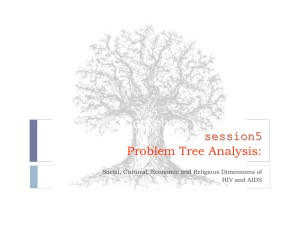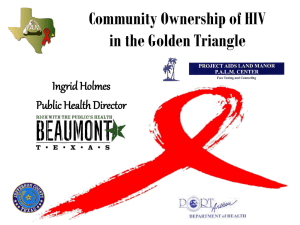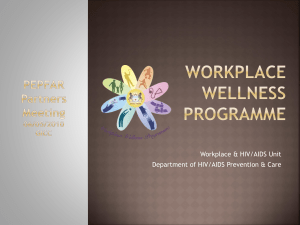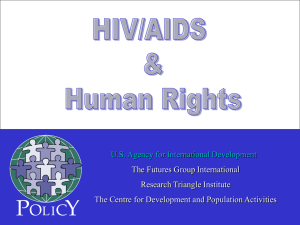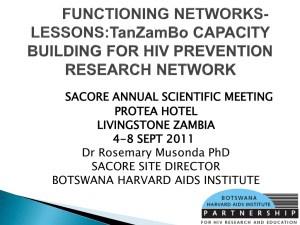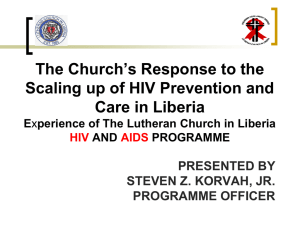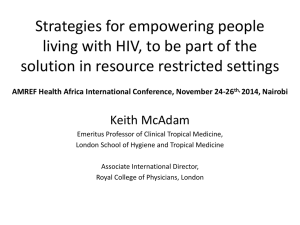capacity building activities
advertisement
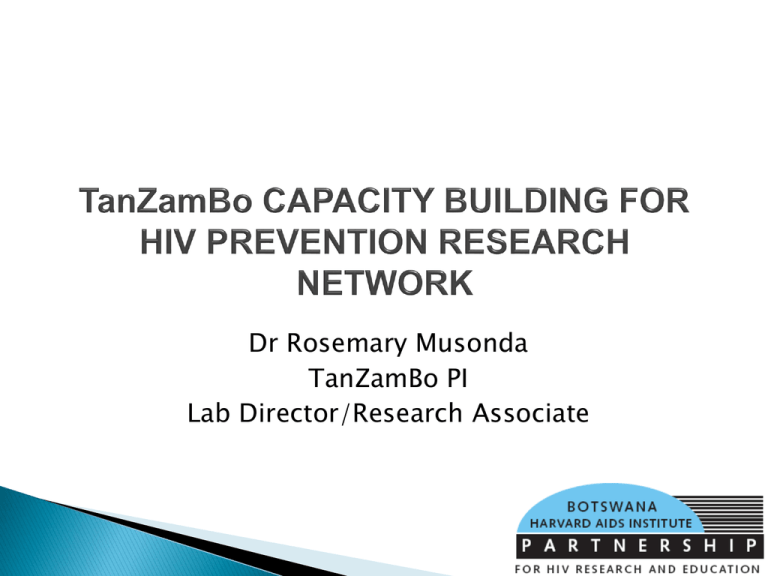
Dr Rosemary Musonda TanZamBo PI Lab Director/Research Associate The Botswana-Tanzania-Zambia Capacity Building Network called TanZamBo (Tanzania Zambia Botswana) KCRI/KCMC, TDRC and BHP Mc Gill University in Montreal and Harvard University School of Public Health in Boston). The Botswana Harvard AIDS institute Partnership (BHP),(LLC) will serves as the lead Principal Recipient To develop sustainable HIV/AIDS prevention trial expertise in Botswana, Tanzania and Zambia with an emphasis on “learning by doing” using existing collaborations in Africa, Canada and the USA Or expanding the capacity of researchers to conduct various HIV/AIDS prevention trials including vaccines. The team members will use their comparative advantage in expertise and technology to strength the capacity of weaker institution in HIV prevention interventions such as the through “learning by doing This project will recruit young scientists for MSc degrees in Clinical Research or Biostatistics. In addition the project will also build capacity of post doctoral fellows who will be co managing the TanZamBo project at every site with site PIs This project will recruit young scientists for MSc degrees in Clinical Research or Biostatistics. In addition the project will also build capacity of post doctoral fellows who will be co managing the TanZamBo project at every site with site PIs Strengthen clinical trials capacity through south south networking between BHP,KCMC,TDRC and north south networking with Mc Gill and Harvard universities; to expand capacity to conduct various HIV/AIDS prevention trials including vaccines using our comparative advantage for strength in expertise; to train several young scientist for Masters of Science degree in biomedical sciences, bioinformatics or biostatistics; to strengthen the capacity of post doctoral scientist in project management and supervision of young scientist in research activities; to build capacity in the weaker site particularly the through “learning by doing” and short term training to strengthen the capacity of institution review boards/ethics committee and to provide platforms for advocacy and dialogue with communities and policymakers to support HIV/AIDS prevention trials including HIV vaccine research and development in Africa. Long term training of research fellows for Master of Science Degree(MSc) and Post doctoral fellows: MSc students will be enrolled at the KCMC –Tumani University College for training in clinical research, microbiology or immunology. Short Term Training: A short course on biostatistics and epidemiology will be conducted at any of the African site for juniors as well as a newly established 3 months short course in Clinical trials Design under the McGoldrick fellowship for senior scientist to go to Harvard in Boston Short Term Training: A short course on biostatistics and epidemiology will be conducted at any of the African site for juniors as well as a newly established 3 months short course in Clinical trials Design under the McGoldrick fellowship for senior scientist to go to Harvard in Boston HSPH –HAI will offer short course on characterization of HIV-1 viral genome sequences that may be most important for vaccine designs to prevent acute and early infections. The Mc Gill AIDS centre Group will provide training in advanced laboratory methods for i) virological markers as trial end points ii) HIV sequence signature matching iii) ultra sensitive Viral load assays using dried blood spots iv) and drug resistance genotyping for K65R mutations with emphasis on “learning by doing”. Other courses will include clinical effectiveness, advanced HIV/AIDS prevention and treatment, training in GCP, GCLP quality management systems and grant writing and these courses will be held locally with co funds from other capacity training grants such as EDCTP. Networking activities: Attachments in Harvard in Boston (2-6 months) to learn specific techniques such as PCR amplification, sequencing, real-time PCR, virus isolation, and co-culture; and functional immunologic assays (ELISPOT and intracellular cytokine staining); and statistical management of trial data. South South networking will include attachment to BHHRL Botswana sites to gain experience in trail design, setting up longitudinal cohort for acute infections studies and incidence determinations; Community engagement and training in HIV prevention research: This will involve community advisory board (CAB) engagement in HIV prevention research training in basic facts, in prevention technologies and HIV vaccine issues, ethical issues; support to CABs in community sensitization activities; training in leadership, advocacy skills for HIV prevention Strengthening of Review Boards: This will include refresher training of institutional and national review boards or ethics committees in human subject research with respect ethic and informed consents in prevention trials. Creating Platforms for dialogue with policy makers and researcher for advocacy on HIV/AIDS prevention research and trials. This will be done through joint meeting with SADC secretariat and to target SADC parliamentary Monitoring and Evaluation of the TanZamBo network: The project will assemble a team of experts to come and monitor and peer review the project activities and project outcomes and process indicators set in the activity plan. Long term training of research fellows for Master of Science Degree (MSc) and Post doctoral fellows: Expected outcomes: Increased human capital to conduct research in HIV prevention in Africa and ability to compete for grants and become investigators. Short Term Training in biostatistics and epidemiology, in clinical trials design, advanced laboratory techniques HIV/AIDS management and GCP/GCLP and QA/QC, project and data management and other clinical trials related trainings. Expected outcomes: strong competent cadre of scientist/ researchers with increased capacity to publish in peer review journals ◦ Networking activities: Training attachments for specific training or techniques, exchange programs, joint projects, information sharing on research protocols and findings. Expected outcome: Strong networks of researchers, with joint publications. ◦ Infrastructure capacity improvement clinical and laboratory facilities: Expected outcome: Improved efficiency, quality of results and research environment ◦ Infrastructure capacity improvement clinical and laboratory facilities: Expected outcome: Improved efficiency, quality of results and research environment Community engagement and training in Expected outcome HIV prevention research: Expected outcome: To have informed and supportive communities. Strengthening of Review Boards: Expected outcome: Increased capacity and efficiency in reviewing proposals. Creating Platforms for dialogue with policy makers and researcher for advocacy on HIV/AIDS prevention research and trials: Expected Outcome : Supportive policy environment and improved grant allocations by African government and funding agencies. Monitoring and Evaluation of the TanZamBo network: Expected Outcomes: Positive progress report that informs project management and stakeholders. G Kibiki, M Essex, V Norvitsky M Wainberg, MMulenga, V DeGruttola & L.Okui, Simani Gaseitsiwe, R Handema, J Makhema, M Mmalane, R Madison, B Nyombi, S Moyo, H Bussmani, A Ogwu, E Kussaga, J Malama, L, Simbeye, D Amenigy, Carrie Kachoria, Parmod Chandna etc KCRI, TDRC, BHP
